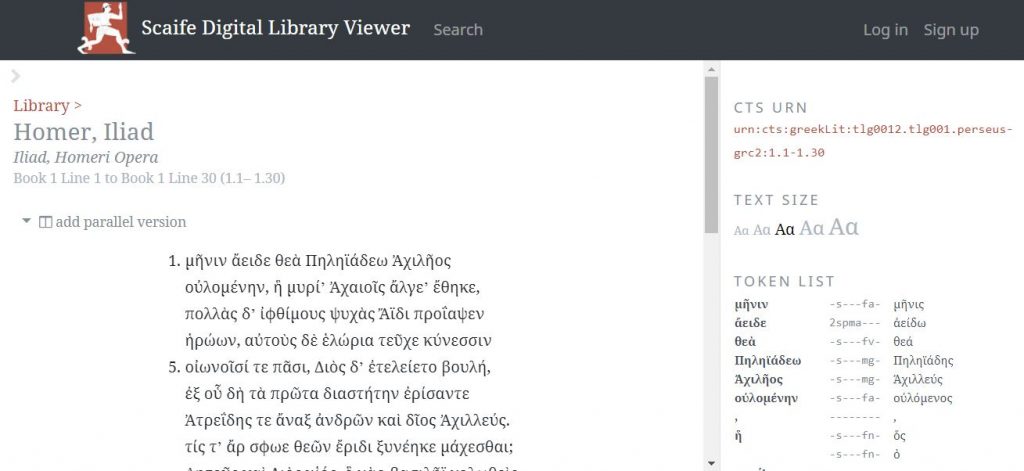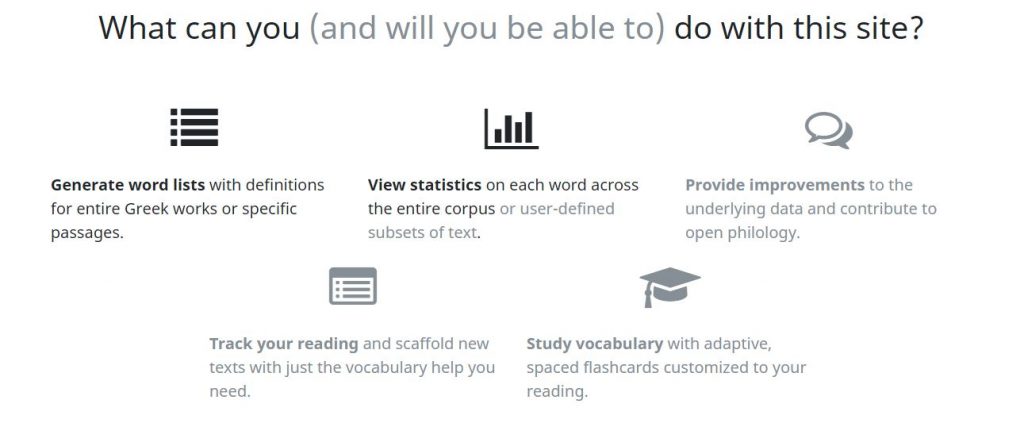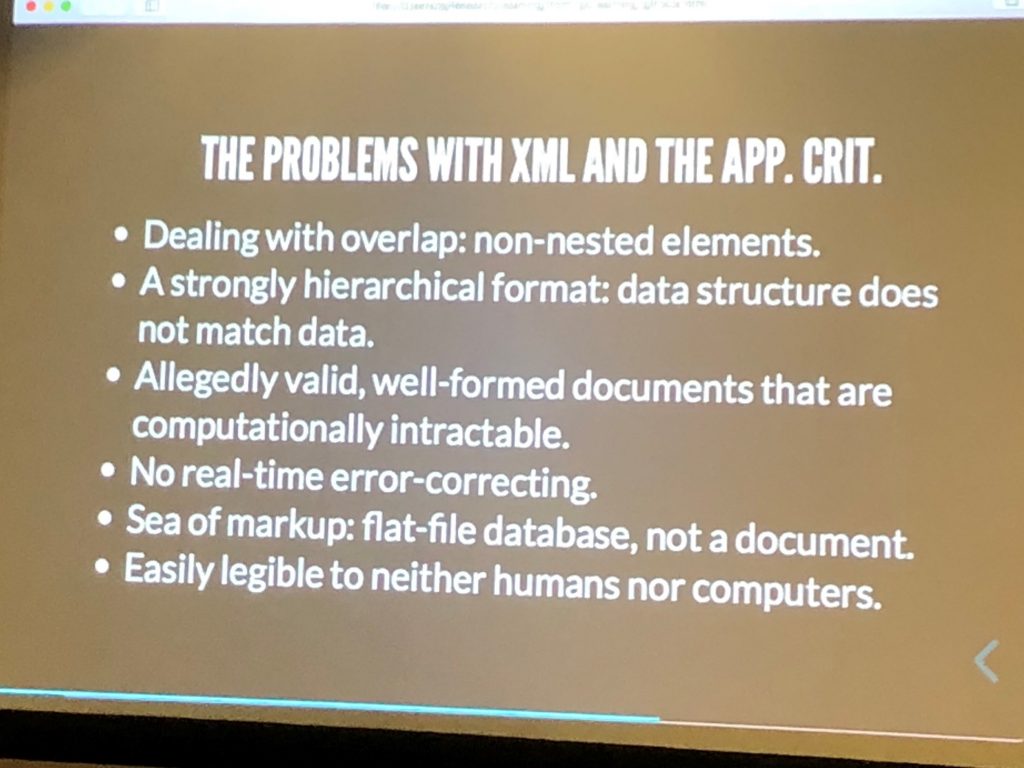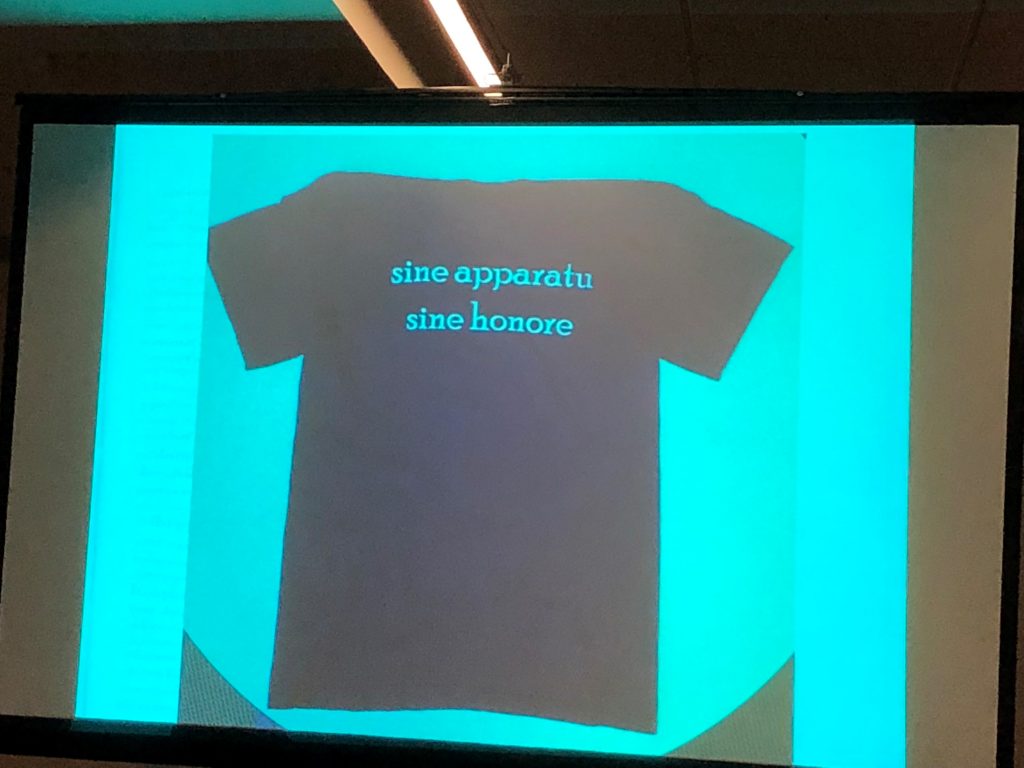One of the things I learned at the SCS meetings this past weekend is that it is important to echo and amplify on social media ideas and voices you find important. My favorite notion this year came from Gregory Crane, in a talk about the Open Greek and Latin Project: classicists should see themselves less as professors, experts, and authorities, and more as enablers and servants of the community of readers of classical texts.
Here is his list of the OGL’s goals in full:
- 2 or more editions for as much of Greek and Latin as possible
- CC licensing (CC-BY-SA)
- Smooth pathway from Images of text-bearing objects through an open-ended and evolving set of machine actionable annotations
- Based on evidence rather than authority
- Community driven
- Paid professionals as enablers and servants
- Multilingual emphasizing global access and exchange
There is much in this list to discuss. A key piece of context is the imminent arrival of the new Perseus interface, the Scaife Digital Library Viewer, which is set to debut on the Ides of March. Those who attended the OGL pre-conference workshop, or the Ancient MakerSpace session by the developer James Tauber, got a live preview of this lovely new package for Perseus data and tools. Here is a screenshot, which, it should be noted, is a work in progress.

Pre-release draft of the new Scaife Viewer for Perseus 5.0
Notice the CTS URN in the upper right hand corner, a key piece of infrastructure. Note also the “Log in”: users will be able to contribute much more directly than is now the case. When individual words are highlighted the url will change, allowing a unique identifier that can be used as a stable peg to hang annotations on. Very exciting. The new Greek Word Study Tool will have several new features, including the ability to provide improvements and “contribute to open philology” through things like treebanking and commenting on texts.

Greek word study tool feature list
Crane’s presentation was part of the annual Digital Classics Association panel, which is always exciting, and this year was no exception. Sam Huskey gave an update on the Digital Latin Library, and tools he is helping develop that will partly automate the creation of TEI-XML encoding for apparatus criticus of Latin editions. The scholar creates a spreadsheet of variants attributed to certain witnesses, and a nifty Python script creates the appropriately tagged XML. This will get you only part way, of course. At certain junctures scholarly judgment has to intervene in the constitution of a text. The brilliance of this new tool is that it actually makes clear what is rote reporting of variants and what is actual scholarly intervention. It clearly and unambiguously marks out the intellectual labor that goes into the creation of a critical apparatus, something that every dean and tenure committee can use to give scholars appropriate credit.
Peter Heslin gave a fascinating paper arguing, in apparent contradiction to Huskey, that TEI-XML is not the best way of encoding critical apparatus. Rather, we should be using as a model the version control of Github, which simply stores different versions of a document in parallel, until the user wants to know what the differences are between them. He pointed out that a traditional apparatus is a rhetorical device for supporting a single version of the text, but is quite unhelpful if you want to know how similar or different two versions of a text are (say, the Propertius texts of Barber and Goold). In the discussion it became apparent that the two approaches a complementary, but Heslin’s talk was quite the satisfying (to me) attack on TEI-XML as a data model. Here are his main beefs:

Peter Heslin: The Problems with XML and the App. Crit.
Thomas Koentges gave an absolutely wonderful talk on the uses of distant reading techniques for Greek stylometry. Using the vastly increased corpus of Greek from the First Thousand Years of Greek project he is able to use topic modeling to show quite clearly the in-authenticity of Plato’s Menexenus–only the most die-hard skeptic would disagree, it seems to me. The essence of the technique is to use the signature of relative frequency of extremely common tokens–the equivalent of our thes, ands, buts, and howevers–to group works and authors.
Cynthia Damon discussed her amazing success in getting students, ranging from high school age to undergrad to post bac to graduate, involved in that holiest of inaccessible mysteries of classical scholarship, textual criticism and the creation of the apparatus criticus. First, she teaches them how to read an app crit, leading them through the process of expanding into plain English what the apparatus is saying and what it is trying to do. Then she has teams of students transcribe individual manuscripts (of the Bellum Alexandrinum in this case) and note variants. These variants are placed into spreadsheets of the type Sam Huskey was describing, classifying and describing them, and choosing which should be displayed in the apparatus itself. Then information from existing apparatuses is integrated (in this case those of the Teubner and Bude texts). In addition to creating an entirely new text and apparatus for much of the Bell. Alex., the students identified 30 errors in the apparatuses of the Teubner and Bude editions. The electrifying effect of having students involved in the creation of new scholarly knowledge can be judged by the fact that three of the students made the journey to the Boston Marriott in freezing weather to attend the session. All told, 80 students have been involved so far. In one class, the students came to the final exam with a gift of a t-shirt for their professor: sine apparatu, sine honore

Sine apparatu, sine honore: T-shirt made by Cynthia Damon’s students at the University of Pennsylvania
Crane’s vision for OGL is to “make Greek and Latin play the biggest possible role in the intellectual life of human civilization.” OGL aims not just to present Greek and Latin texts in a readable fashion, but to be the focus of communities of readers and citizen scholars like those that Cynthia Damon is cultivating, and like the ones centered around the Holy Cross Manuscripts, Inscriptions, and Documents Club and its new off-shoot at Tufts. This philology is to be “community driven.” By getting students and others involved in the creation of scholarship through digital projects we prepare them for the future of work, he argues. Above all, philology must show its relevance if it is to survive in the competitive intellectual and institutional landscape of the coming decades. “We live in a world of fake news where truth doesn’t matter. Philology is an answer.”
During the question period I asked how each presenter thought about their users, how they imagined the audience for their work. In most cases they said variations of “this will be useful to scholars.” Crane’s answer was strikingly different. Professionals are “the least important audience,” he said. Rather, the proper role of the paid professional is to be the servant, the enabler of the community of citizen scholars and students. This is a vision that is profoundly important for our field, I believe. It motivates the scholars who contribute to DCC and to many other fine digital projects. Indeed, it has long been a part of the ideals of classical scholarship, for example in the late nineteenth century, when top scholars routinely wrote works for beginning students. Now, in what Crane called rather derisively the contemporary “print classics” world, this ideal has been somewhat forgotten. All too often scholars speak only to each other, and strive only to earn each others’ praise.
This is not a call for “popularization” or “public facing scholarship,” both of which are quite valuable in themselves, but a call to find ways to create the kinds of scholarly and reading communities within and beyond the academy that will ensure the utility and contribution of our discipline in the coming decades. My intuition is that the way to do these things is to strive to broaden access to and understanding of the primary texts we love.
I’ve just read this. Fundamentally very important, I’d say. Lots of very exciting developments and I obviously endorse your last couple of paragraphs.
Some questions:
Do I need to learn XML properly? I know a bit about it.
More importantly perhaps, do I keep linking to Perseus, when I’m writing about Apollonius, if everything is going to change?
Peter
P.S. I’m going to see a 10th century mss. of Bede’s De Re metrica next Monday. Follow up to Historia Ecclesiastica selections?? I fancy a Latin project!?
Peter